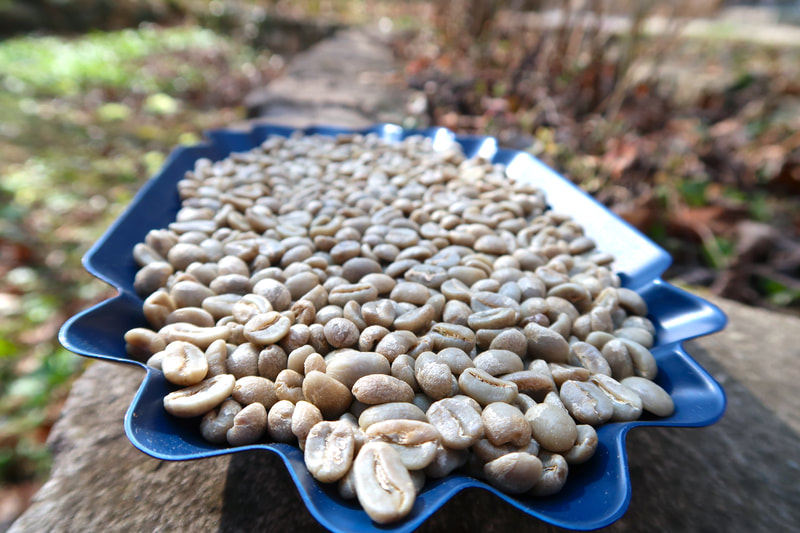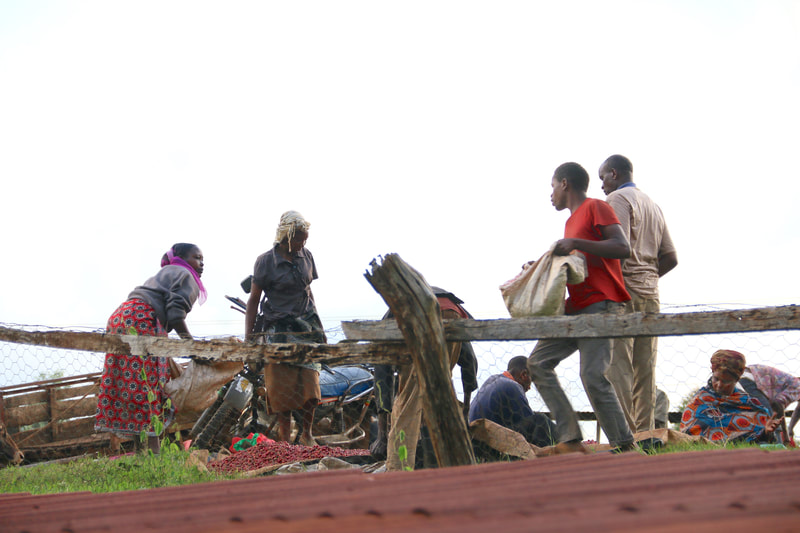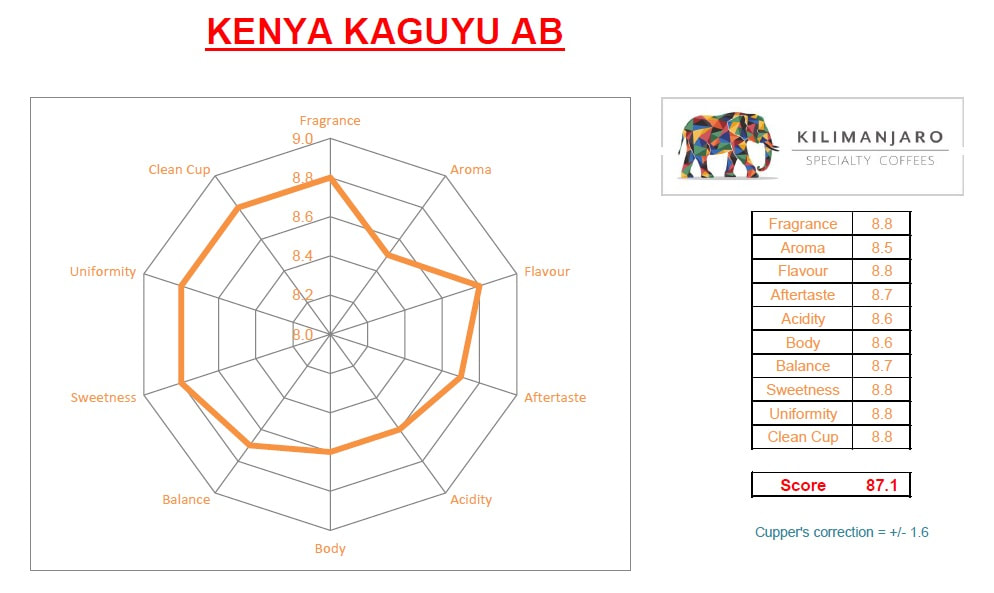KENYA KAguyu AB
General Information
|
Origin: Kenya
County: Kirinyaga Cooperative: Inoi FCS Washing Station: Kaguyu Farmers: 1000 active members Cultivar: SL28 - SL34 Altitude: 1750 - 1800 masl Process: Fully washed with double fermentation Harvest: November 2020 - January 2021 Cherry Price | FOB Price: 5.46 USD/Kg | 8.32 USD/Kg Screen | Moisture | Density: 15-16 | 9.8% | 0.715 g/ml Packaging: 30 Kg + GrainPro Score: 87.1 Notes: Tangerine, fig, jasmine, honey Ikawa profile: KSC basic profile 50g #2 |
TRACEABILITYKaguyu is a washing station or factory (as they are commonly called in Kenya), located near Kerugoya town in the Ndia division of Kirinyaga county in Kenya. The county is lying on the slopes of the amazing ice peaked Mount Kenya.
Kaguyu has an altitude of 1750-1800 masl, enjoying two distinct wet seasons. An annual average rainfall of more than 1500 mm is recorded in this county. The region's soil is enriched with organic matter due to its deep volcanic red soils. Kaguyu factory belongs to the Inoi FCS, comprising of 11 factories. The cooperative grows coffee in total area of 200 hectares, with an annual production of 250,000 kgs of green coffee. The coop has 1000 active members, growing an average of 200-300 trees on each farm. Coffee cherries are selectively hand picked and brought to the factory for processing. The coffees are processed with fully washed with double fermentation method. The factory's water comes from the Rutui river, where the soaking pits in the factory recycle the water. After pulping, the coffee is dry fermented overnight, before it's washed in grading channels, then soaked for 24-48 hours in clean water and finally spread out on raised beds for defect selection and sun drying. Farmers from this area also grow tea, bananas, and corn in their farms, under the shade provided by macadamia, eucalyptus, and grevillea trees. HISTORYDespite its proximity to Ethiopia, coffee was not cultivated in Kenya until 1893, when the "Fathers of the Holy Ghost" (French catholic missionaries), introduced coffee trees from Reunion Island and planted them near Mombasa.
** Interesting Fact: The Bourbon variety was first cultivated on a small island that today is known as "Reunion Island". It is located in Africa, in the Indian Ocean, east of Madagascar. It is considered a region of France and until 1789 its name was "Bourbon Island", in honor of the royal house of the Bourbons. ** In 1896, the first plantations were introduced in Kiambu - Kikuyu district, a very fertile area, which in 1912 already saw large plantations of several acres of expansion; there were mainly cultivated Bourbon and Mokka varieties. While credit for the introduction of coffee in Kenya corresponds to Catholic missionaries, were the English settlers, who accelerated the importance of coffee in the Kenyan economy. Large-scale production of coffee and other crops, were heavily increased to export them into Europe, in order to pay the exorbitant debts generated by the construction of the railway connecting Uganda with the port of Mombasa in 1901. After Kenyan independence from the British Empire in 1963, the long experience and extensive knowledge about coffee production was very well adopted by small local farmers, resulting in the high quality standards with which today Kenyan coffee is known in the world. VARIETIESThere are two particular varieties that attract most of the interest from specialty coffee buyers in Kenya, these are: SL 28 and SL 34.
The Scott Laboratories were hired to develop new cultivars between 1934 and 1963. The development of cultivars SL, was based on the Mokka and Bourbon varieties, which were introduced into Kenya by Scottish and French missionaries, from Yemen and Reunion Island respectively. Today, these two varieties are responsible for most of the top quality coffees produced in Kenya, but they are susceptible to coffee leaf rust and other diseases. Kenya has done a huge job, trying to find disease resistant varieties. The "Ruiru 11" was the first variety to be considered a success by the "Kenyan Coffee Board". Unfortunately, it has not been well received by importers and the specialty coffee industry in general. By the end of 2010, a new variety called "Batian" rust resistant, and which some say has a better cup than "Ruiru 11", was introduced. We will still have to wait a few more years to know its full potential in the cup and productivity. |
THE PROCESS
Kaguyu FACTORY LOCATION
|
WHERE WE ARE
Barcelona, Spain Santiago, Chile Budapest, Hungary |





